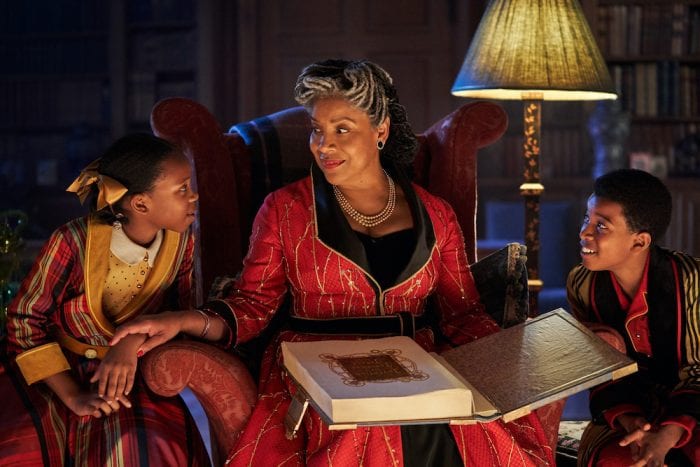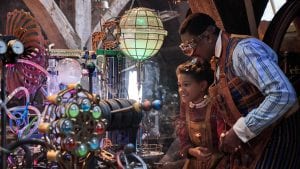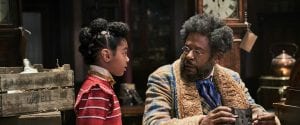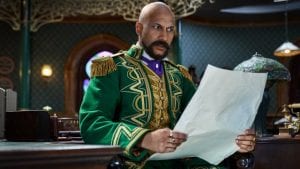Movie Review: Netflix’s ‘Jingle Jangle’ is a pleasant but mixed outing

Reviewed by Jeffrey Sanzel
Thanksgiving heralds the coming of the Christmas season — which means it is time to revisit the myriad opportunities for holiday viewing. In addition to the many Christmas Carols, there are the popular staples — It’s a Wonderful Life, Miracle on 34th Street, and A Christmas Story. Add to these the innumerable children’s classics — Santa Claus Is Coming to Town, Rudolph the Red-Nosed Reindeer, How the Grinch Stole Christmas, Frosty the Snowman — there is viewing for not just days but weeks. And this does not touch on the Hallmark romances, television specials, and “very special Christmas” episodes that seem to populate prime-time.
Filmmakers are constantly looking to add to the tradition, finding something that can become an annual event. Strangely, they have been less successful in the area of musicals, a form that should lend itself to season. Discounting the animated features, the field is pretty thin. For every White Christmas, there is a Mrs. Santa Claus.
Which brings us to Netflix’s offering, Jingle Jangle: A Christmas Journey. There are recommendable aspects in this new film but a lackluster and sometimes clumsy script and uneven storytelling gets in the way of its rising to its potential.

Jeronicus Jangle is an inventor, toymaker, and proprietor of Jangles and Things. He has just received a component for his latest invention that will change the world of toys. This element brings to life an automaton, Don Juan Diego, a matador doll. Jeronicus goes out to celebrate with his family, leaving his apprentice, Gustafson, in charge.
Gustafson, who feels underappreciated, is tricked by Diego (who doesn’t want to be mass-produced) into absconding with him and Jeronicus’ book of inventions. This choice destroys Jeronicus’ empire; as his fortunes fail, Gustafson becomes a huge success.
Fast forward to Jeronicus as a bitter widower, estranged from his daughter. He has turned the toy emporium into a pawnshop which is now on the verge of bankruptcy. However, he continues to tinker with the ideas that had given him his start.
Enter his granddaughter Journey, brilliant in her own right, with a burning to desire to bond with her grandfather. Unsurprisingly, she becomes the catalyst for his resurrection and redemption, all centered around a robot called the Buddy 3000. The major conflict arises from Gustafson’s desperate need for a new product. This fuels the action for the latter part of the story.
The energy ranges from hyper-kinetic to meandering. The result is a strange “fast-slow” whereby the plot holes become pronounced. Perhaps they are banking on the younger viewers not seeing them but this is a mistake. Never underestimate the insight and instinct of children. As much as they will enjoy the magic and pageantry, there is a good chance that they will wonder about some of the more unexplained or contradictory moments. Or, even worse, lose interest.
Concepts from other fare — if you believe, you can fly — are borrowed but not transformed.
David E. Talbert is both writer and director, and it might have served the project to have some objective distance to solve the problems. The score is a mix of hip hop, R&B, pop, and a bit of traditional musical theatre. The songs, by Philip Lawrence, Davy Nathan, Michael Diskint, and John Legend, are all serviceable but nothing overly memorable.

The choreography is enthusiastically athletic. Ashley Wallen recreates his success with The Greatest Showman’s “This Is Me” with “This Day”— but it seems like all the same and less. The fact that it comes so early in the film is also not helpful: We don’t know who those people are so it is hard to invest. Sadly, there is no finale whereby Wallen could have once again engaged us — but this time we would have had the knowledge of the journey.
There is no question that the look of Jingle Jangle is a visually rich if overwhelming one. A cross between benign Steampunk and Willy Wonka and the Chocolate Factory, it is a vibrant world, full of bold colors and brass gears. The costumes (by Michael Wilkinson) are loudly spectacular in their delicious gaudiness. Gavin Bocquet’s production design is clever and creative, mixing steroidal Victorian with just a hint of FAO Schwarz.
Forest Whitaker just manages to nuance Jeronicus beyond a standard Christmas curmudgeon. He commits to the recluse’s petulance but allows us to see the struggle beneath. He also dodges the saccharine trap most associated with these cantankerous characters. He has a light but pleasant singing voice, which is nicely showcased in the ballad “Over and Over.”
Keegan-Michael Key’s adult Gustafson is a sort of villainous Wizard of Oz (right down to the green costume for his entrance). He seems to be having a grand time in the big number “Magic Man G” but sometimes it seems that he is searching for the right tone. He is a gifted comedian and a solid actor but the script doesn’t commit to a character.
Madalen Mills as Journey has a great deal to carry. She has a lovely singing voice and an open, honest persona, believable as the exuberant young genius. She is given a huge solo with “Not the Only One” and truly owns it. Anika Noni Rose, a very strong actor, plays her mother but, unfortunately, does not enter until late in the film — much past the point of introducing a new character with high stakes. Phylicia Rashad adds both elegance and eloquence as the storyteller.

One of the stranger choices is Jeronicus’ love-interest. The romantically aggressive postwoman Ms. Johnston is a bit over-the-top but Lisa Davina Phillip does her best to give her genuine warmth. It is strange that they didn’t opt for an actor who could actually do her own singing; instead, Marisha Wallace provides this with great style. Hugh Bonneville is barely on screen as the banker Mr. Delacroix; one feels that the role could have provided more forward movement if written to be an antagonist, rather than a semi-supportive, minor player. Ricky Martin is amusing if predictable as the voice of Don Juan Diego.
Jingle Jangle is a pleasant but mixed outing. It’s heart is absolutely in the right place and its messages of family, honesty, and perseverance are welcomed. But, with its convoluted plot and inconsistent pacing, it sadly won’t find a permanent place in annual visits.
Rated PG, Jingle Jangle: A Christmas Journey is now streaming on Netflix.






